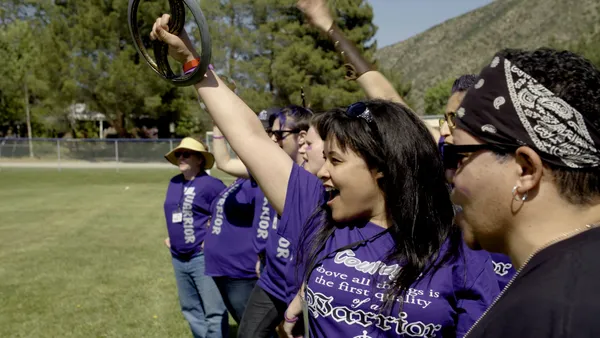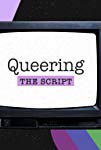Eye For Film >> Movies >> Queering The Script (2019) Film Review
Queering The Script
Reviewed by: Jennie Kermode

When parents worrying that learning about the existence of lesbian, gay and bisexual people might somehow change their children's sexuality, there's an obvious counter argument: millions of us grew up surrounded by non-stop heterosexual propaganda and it didn't do a damn thing to make us straight. For straight people this can sometimes come as a bit of a shock because it takes a moment to realise that what seems very ordinary - if it doesn't clash with one's own feelings and expectations - is actually sending out a very strong message all the time. If you're a girl, you should be excited about boys. Find one who's better than the others. Marry him. Settle down, reproduce, await the harvest of grandchildren. It's everywhere - in films, on television, on the radio, in computer games, in pop songs, in art galleries, in billboards on the street. We think of it as normal when it is - as Oscar Wilde put it - merely common.
Growing up without seeing any representations of people like oneself, or of lives lived the way one longs to live one's own, can do real psychological damage. It's one of the reasons why queer teenagers often suffer from acute loneliness even when they have supportive families. But human creativity has a way of find solutions. Marginalised people fight back. Gabrielle Zilkha's documentary looks at how queer women have done so using imagination, shared stories and, eventually, vocal activism. It looks at how these initially small actions have transformed the television landscape.

You don't need to be queer yourself to enjoy this documentary. Frankly, it's refreshing to see any film that features women having a good time at fan conventions without wearing Princess Leia slave girl outfits. Zilkha's research is detailed, her ideas effectively presented, and the passion of the women involved inspiring. It's angry in places but it's also very funny. In one scene, Renée O'Connor, better known to TV viewers as Gabrielle, describes how she and Lucy Lawless had filmed a whole series of Xena: Warrior Princess before they realised that huge numbers of viewers saw their characters as a couple, despite the writers having clearly had that in mind from the start. Despite the surprise, they quickly warmed to the idea and immersed themselves in fan culture; one woman here has photographs of Lawless attending her wedding.
There was, Zilkha suggests, a time before Lexa and a time after Lexa, referring to a bisexual character in The 1100 who was killed off just after she finally consummated her love for another woman. It was a point at which fans who had learned to be grateful for scraps finally lost their tempers. Killing off queer characters is of course a long-established habit in film and TV, with its origins partly in the moral prescription of the Hayes code. Zilkha examines it here alongside other problematic clichés: the predatory lesbian, the lesbian who is 'cured' by sex with a man, the bisexual woman who can never commit to a woman or a man, etc. She's also explores more difficult issues such as having queer characters who are villains - whilst it's important not to feed negative stereotypes that can put queer people in physical danger in real life, it's also important to have queer characters who express a full range of human behaviours and are not just boring and nice all the time.
There's not much that's really revelatory here for those who have already given the subject some thought, but that almost reinforces Zilkha's point because the whole premise of the film is that providing for queer fans is an obvious thing to do and that where it doesn't happen, those fans will identify certain characters as queer anyway. There's an exploration of the early days of slash fiction and how it was liberating for its creators in a way that went beyond the erotic - indeed, there are lesbians here who talk about how freeing it felt to read for the first time other fans' interpretations of the relationship between Captain Kirk and Mr Spock.
Going from this to seeing real representation on screen was overwhelming for some. Zilkha reflects on the importance of The L Word but also looks at what it got wrong, and how what liberates thin, upper middle class white women can leave a lot of others behind. There's a focus on the need to provide much more visibility for trans women, non-binary people and women of colour, and a look at how the increasing ease with which ordinary members of the public can now create their own web series is starting to address this.
All in all, this is a pretty thorough introduction to the issues at hand and a celebration of the progress that has been made, often through the efforts of fans themselves. It's also an affecting look at geekdom and the way that affection for fictional characters can bring people together and help them to assert themselves in the wider world. With lots of enthusiastic contributors, it's a film that has a real sense of joy about it. You won't need to be a geek yourself to be left with a big smile on your face.
Reviewed on: 18 Jul 2019
















